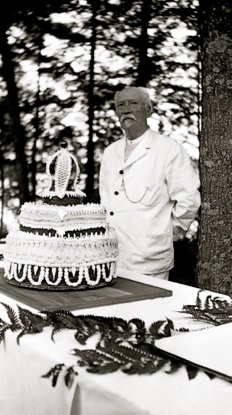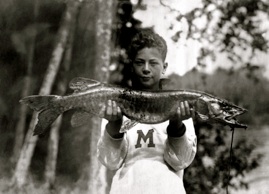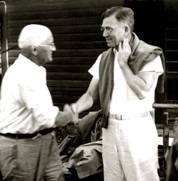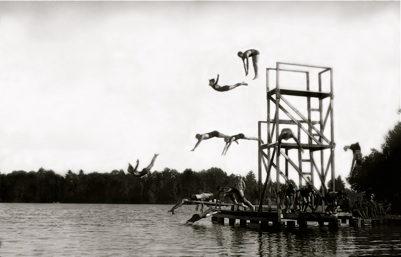Clockwise from upper left: Grandpa James Frew, Camp’s colorful baker from 1909 - 1928 helps celebrate the first Camp Birthday celebration in 1914, Doc’s first year as owner. The Camp Birthday is now celebrated the 2nd Saturday of Second Term. Next: Diving Towers Extraordinaire! Senior campers show us their stuff, 1921. Next: Tom Monilaw, Doc’s only son, holding his prize circa 1914. Next: Dr. Angus ‘Froctor’ Frew and Dr. William J. Monilaw (‘Doc’) shake hands in the 30s. “Froctor” was the son of Grandma and Grandpa Frew, and Senior Head Counselor from 1905 - 1940. Next: “Going for the Mail”, a picture taken by James Colby of the Northern Photo Company, was taken standing on the edge of the boathouse pier with Hooks Point in the background. The driver is Camp’s first caretaker, Ernie Alton. Ernie was also the first Mayor of Sayner. The Highlands Launch was purchased in 1905, retired in 1960, and sits in front of the Vilas County Historical Museum in Sayner today.
Above Left: The wild, storied peninsula across from Camp: Hook’s Point, as captured by Senior Head Counselor Ross Freeland in 2009. The views around Camp have not changed. (See the Archives Magazine for more on Hook’s Point.)
Left: Clearing Trees. We see the genesis of Camp Highlands (our only photo from 1904), as this small group of University of Chicago Lab School students and Malcomb Kester (Harry O. Gillet’s first staff member) cuts a trail along what today is the path from the clubhouse to the office.
(Note: "Oldest Camp West of the Alleghenies" refers to our status as the oldest private camp west of the Alleghenies. There are several YMCA camps that are older than CH.)
“Off to Tenderfoot” The old boathouse, constructed in 1906, just west of where cabin 8 stands today. A camping trip departs with a warm sendoff, 1916.
“All In!” The first Senior swimming pier, 1916. On the pier is ‘Froctor’, Dr. Angus Frew, camps Senior Head Counselor (in white hat) and world class diving coach!
William ‘Perch’ Reeve, University of Chicago Lab School educator and CH counselor, and camper, hold up several days’ catch from the area. 1914
Read more about the Chicago Lab School:
http://en.wikipedia.org/wiki/University_of_Chicago_Laboratory_Schools
The Lab School is one of our nation’s elite schools: http://online.wsj.com/public/resources/documents/info-COLLEGE0711-sort.html
The parent site of the Camp Highlands Archives is:
Camp’s historic cabins have the lowest possible carbon footprint: Zero!
Left: The first cabins were built in 1917, and burned in the Dining Hall fire of 1925. This photo is taken looking towards the Marina from where Cabin 14 stands today.
The magic forest along the shores of Back Bay. On a trail like this, problems disappear, ego vanishes...only the sights and sounds of the forest exist. The woods say to us, “your troubles are really nothing. Just be.”
Highlands Friends: Highlands’ Hall of Famer Fred Winter, center, and his Senior Row staff. 1940s
Staff member Al Pfanstiehl took wonderful portraits of campers and counselors in the mid to late ‘30s, including this one of John Ambruster, a first generation CH man. His son (David) and grandsons (Forest Ambruster & Tyler Sherry) have since been with us. You can view our Pfanstiehl collection on the Monilaw Years page. Aerial shot of the east end of Plum Lake (we think taken in the ‘20s) is a contribution of Jane Field. Jane’s family has owned Wilmot’s Island (foreground) since 1908. Five Pines Island, Hooks Point and the CH peninsula are all pictured here!
In 1928, the Whang Doodle was erected. This only lasted about ten years. The trapeze was a good tool for entering the water in strange positions - not a good thing!
The Camp Song was adapted for CH from the University of Chicago fight song by J. Beach Cragun, known at Camp as ‘Kewpie’. Taken here from the 1916 Dinglebat. ‘Kewpie’ was at the University and taught music at Camp. He lived at 6120 University Avenue, Chicago. See Kewpie and his orchestra pictured in the Monilaw Years.
“Chicago Loyalty”
Chicago we’re true to you! Our Alma Mater ever dear! Chicago we’re true to you! That we are loyal never fear! Rah, Rah!....
Contributions?
Comments?
Corrections?
Contact Tim Bachmann:









